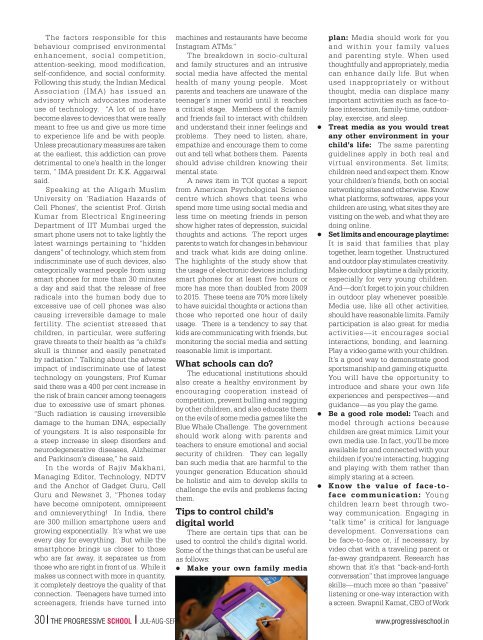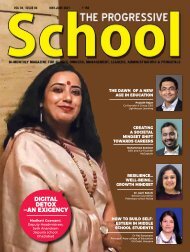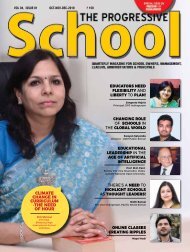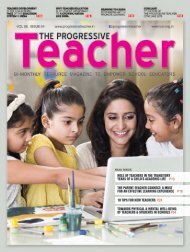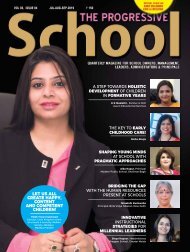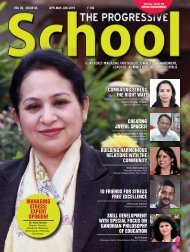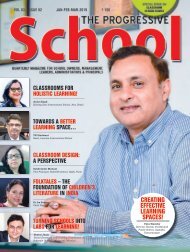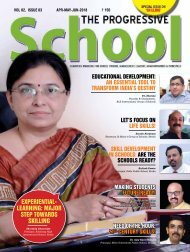The Progressive School Vol 02 Issue 04
The Progressive School is a quarterly magazine for school owners, leaders and principals. It will continue to address vital issues that impact the emerging challenges in the design, administration and growth of schools in all its dimension.
The Progressive School is a quarterly magazine for school owners, leaders and principals. It will continue to address vital issues that impact the emerging challenges in the design, administration and growth of schools in all its dimension.
Create successful ePaper yourself
Turn your PDF publications into a flip-book with our unique Google optimized e-Paper software.
<strong>The</strong> factors responsible for this<br />
behaviour comprised environmental<br />
enhancement, social competition,<br />
attention-seeking, mood modification,<br />
self-confidence, and social conformity.<br />
Following this study, the Indian Medical<br />
Association (IMA) has issued an<br />
advisory which advocates moderate<br />
use of technology. “A lot of us have<br />
become slaves to devices that were really<br />
meant to free us and give us more time<br />
to experience life and be with people.<br />
Unless precautionary measures are taken<br />
at the earliest, this addiction can prove<br />
detrimental to one’s health in the longer<br />
term, ” IMA president Dr. K.K. Aggarwal<br />
said.<br />
Speaking at the Aligarh Muslim<br />
University on ‘Radiation Hazards of<br />
Cell Phones’, the scientist Prof. Girish<br />
Kumar from Electrical Engineering<br />
Department of IIT Mumbai urged the<br />
smart phone users not to take lightly the<br />
latest warnings pertaining to “hidden<br />
dangers” of technology, which stem from<br />
indiscriminate use of such devices, also<br />
categorically warned people from using<br />
smart phones for more than 30 minutes<br />
a day and said that the release of free<br />
radicals into the human body due to<br />
excessive use of cell phones was also<br />
causing irreversible damage to male<br />
fertility. <strong>The</strong> scientist stressed that<br />
children, in particular, were suffering<br />
grave threats to their health as “a child’s<br />
skull is thinner and easily penetrated<br />
by radiation.” Talking about the adverse<br />
impact of indiscriminate use of latest<br />
technology on youngsters, Prof Kumar<br />
said there was a 400 per cent increase in<br />
the risk of brain cancer among teenagers<br />
due to excessive use of smart phones.<br />
“Such radiation is causing irreversible<br />
damage to the human DNA, especially<br />
of youngsters. It is also responsible for<br />
a steep increase in sleep disorders and<br />
neurodegenerative diseases, Alzheimer<br />
and Parkinson’s disease,” he said.<br />
In the words of Rajiv Makhani,<br />
Managing Editor, Technology, NDTV<br />
and the Anchor of Gadget Guru, Cell<br />
Guru and Newsnet 3, “Phones today<br />
have become omnipotent, omnipresent<br />
and omnieverything! In India, there<br />
are 300 million smartphone users and<br />
growing exponentially. It’s what we use<br />
every day for everything. But while the<br />
smartphone brings us closer to those<br />
who are far away, it separates us from<br />
those who are right in front of us. While it<br />
makes us connect with more in quantity,<br />
it completely destroys the quality of that<br />
connection. Teenagers have turned into<br />
screenagers, friends have turned into<br />
machines and restaurants have become<br />
Instagram ATMs.”<br />
<strong>The</strong> breakdown in socio-cultural<br />
and family structures and an intrusive<br />
social media have affected the mental<br />
health of many young people. Most<br />
parents and teachers are unaware of the<br />
teenager’s inner world until it reaches<br />
a critical stage. Members of the family<br />
and friends fail to interact with children<br />
and understand their inner feelings and<br />
problems. <strong>The</strong>y need to listen, share,<br />
empathize and encourage them to come<br />
out and tell what bothers them. Parents<br />
should advise children knowing their<br />
mental state.<br />
A news item in TOI quotes a report<br />
from American Psychological Science<br />
centre which shows that teens who<br />
spend more time using social media and<br />
less time on meeting friends in person<br />
show higher rates of depression, suicidal<br />
thoughts and actions. <strong>The</strong> report urges<br />
parents to watch for changes in behaviour<br />
and track what kids are doing online.<br />
<strong>The</strong> highlights of the study show that<br />
the usage of electronic devices including<br />
smart phones for at least five hours or<br />
more has more than doubled from 2009<br />
to 2015. <strong>The</strong>se teens are 70% more likely<br />
to have suicidal thoughts or actions than<br />
those who reported one hour of daily<br />
usage. <strong>The</strong>re is a tendency to say that<br />
kids are communicating with friends, but<br />
monitoring the social media and setting<br />
reasonable limit is important.<br />
What schools can do?<br />
<strong>The</strong> educational institutions should<br />
also create a healthy environment by<br />
encouraging cooperation instead of<br />
competition, prevent bulling and ragging<br />
by other children, and also educate them<br />
on the evils of some media games like the<br />
Blue Whale Challenge. <strong>The</strong> government<br />
should work along with parents and<br />
teachers to ensure emotional and social<br />
security of children. <strong>The</strong>y can legally<br />
ban such media that are harmful to the<br />
younger generation Education should<br />
be holistic and aim to develop skills to<br />
challenge the evils and problems facing<br />
them.<br />
Tips to control child’s<br />
digital world<br />
<strong>The</strong>re are certain tips that can be<br />
used to control the child’s digital world.<br />
Some of the things that can be useful are<br />
as follows:<br />
• Make your own family media<br />
plan: Media should work for you<br />
and within your family values<br />
and parenting style. When used<br />
thoughtfully and appropriately, media<br />
can enhance daily life. But when<br />
used inappropriately or without<br />
thought, media can displace many<br />
important activities such as face-toface<br />
interaction, family-time, outdoorplay,<br />
exercise, and sleep.<br />
• Treat media as you would treat<br />
any other environment in your<br />
child’s life: <strong>The</strong> same parenting<br />
guidelines apply in both real and<br />
virtual environments. Set limits;<br />
children need and expect them. Know<br />
your children’s friends, both on social<br />
networking sites and otherwise. Know<br />
what platforms, softwares, apps your<br />
children are using, what sites they are<br />
visiting on the web, and what they are<br />
doing online.<br />
• Set limits and encourage playtime:<br />
It is said that families that play<br />
together, learn together. Unstructured<br />
and outdoor play stimulates creativity.<br />
Make outdoor playtime a daily priority,<br />
especially for very young children.<br />
And—don’t forget to join your children<br />
in outdoor play whenever possible.<br />
Media use, like all other activities,<br />
should have reasonable limits. Family<br />
participation is also great for media<br />
activities—it encourages social<br />
interactions, bonding, and learning.<br />
Play a video game with your children.<br />
It’s a good way to demonstrate good<br />
sportsmanship and gaming etiquette.<br />
You will have the opportunity to<br />
introduce and share your own life<br />
experiences and perspectives—and<br />
guidance—as you play the game.<br />
• Be a good role model: Teach and<br />
model through actions because<br />
children are great mimics. Limit your<br />
own media use. In fact, you’ll be more<br />
available for and connected with your<br />
children if you’re interacting, hugging<br />
and playing with them rather than<br />
simply staring at a screen.<br />
• Know the value of face-toface<br />
communication: Young<br />
children learn best through twoway<br />
communication. Engaging in<br />
“talk time” is critical for language<br />
development. Conversations can<br />
be face-to-face or, if necessary, by<br />
video chat with a traveling parent or<br />
far-away grandparent. Research has<br />
shown that it’s that “back-and-forth<br />
conversation” that improves language<br />
skills—much more so than “passive”<br />
listening or one-way interaction with<br />
a screen. Swapnil Kamat, CEO of Work<br />
30 THE PROGRESSIVE SCHOOL JUL-AUG-SEP 2018<br />
www.progressiveschool.in


